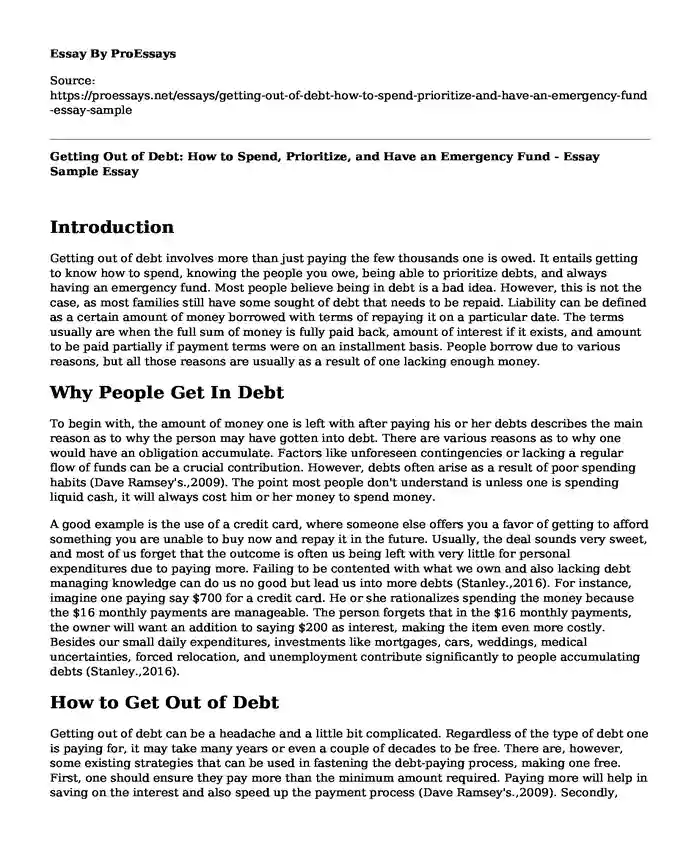Introduction
Getting out of debt involves more than just paying the few thousands one is owed. It entails getting to know how to spend, knowing the people you owe, being able to prioritize debts, and always having an emergency fund. Most people believe being in debt is a bad idea. However, this is not the case, as most families still have some sought of debt that needs to be repaid. Liability can be defined as a certain amount of money borrowed with terms of repaying it on a particular date. The terms usually are when the full sum of money is fully paid back, amount of interest if it exists, and amount to be paid partially if payment terms were on an installment basis. People borrow due to various reasons, but all those reasons are usually as a result of one lacking enough money.
Why People Get In Debt
To begin with, the amount of money one is left with after paying his or her debts describes the main reason as to why the person may have gotten into debt. There are various reasons as to why one would have an obligation accumulate. Factors like unforeseen contingencies or lacking a regular flow of funds can be a crucial contribution. However, debts often arise as a result of poor spending habits (Dave Ramsey's.,2009). The point most people don't understand is unless one is spending liquid cash, it will always cost him or her money to spend money.
A good example is the use of a credit card, where someone else offers you a favor of getting to afford something you are unable to buy now and repay it in the future. Usually, the deal sounds very sweet, and most of us forget that the outcome is often us being left with very little for personal expenditures due to paying more. Failing to be contented with what we own and also lacking debt managing knowledge can do us no good but lead us into more debts (Stanley.,2016). For instance, imagine one paying say $700 for a credit card. He or she rationalizes spending the money because the $16 monthly payments are manageable. The person forgets that in the $16 monthly payments, the owner will want an addition to saying $200 as interest, making the item even more costly. Besides our small daily expenditures, investments like mortgages, cars, weddings, medical uncertainties, forced relocation, and unemployment contribute significantly to people accumulating debts (Stanley.,2016).
How to Get Out of Debt
Getting out of debt can be a headache and a little bit complicated. Regardless of the type of debt one is paying for, it may take many years or even a couple of decades to be free. There are, however, some existing strategies that can be used in fastening the debt-paying process, making one free. First, one should ensure they pay more than the minimum amount required. Paying more will help in saving on the interest and also speed up the payment process (Dave Ramsey's.,2009). Secondly, apply the debt snowball method, which involves coming up with a list of all debts you owe from organizations. Prioritize the debts using any excess funds in paying the small debts until you are completely done. The process continues until the most significant debt is cleared. Another way of getting out of debt is by use of a side hustle. This method involves the use of skills and talents to make extra money apart from one's regular earnings (Jones.,2018).
How to Thrive After Becoming Debt Free
There is a lot that needs to be done when striving to debt-free. First, there is a need to change one's mindset when it comes to money. This change in mentality involves changing the perspective of who we are in the community and what we think we need to do to fit.in addition, there is a need to think of a debt-free future (Jones.,2018). Always ensure you account for your finances to avoid spending on things you don't need. To avoid being in debt, it is also important to ever spend only when there is a need to spend. Set financial goals to determine where you want to be tomorrow (Jones.,2018).
Conclusion
The fact is that most people spend more than their monthly earnings, which is a clear indication that most people struggle with debt. As much as we may view financial institutions as debt bullies, it is, however, two-way traffic since we need to be accountable for our spending. Arguably being in debt is never a good idea. It is, still, a requirement in the modern society that one carry's some form of debt. Since statistics show that most people at one point in their life carry a debt, then the big question is why some of them succeed in paying the debt and being debt-free while a valid number of them scuffle to remain afloat.
References
Dave Ramsey's. How to be financially fit...Ramsey, DaveSoldiers; Jul 2009; 64, 7;
ProQuestpg.38 Jones, S. (2018). How to get out of debt (Part 2). Personal Finance Newsletter, 2018(450), 9-12.
Stanley, L., Deville, J., & Montgomerie, J. (2016). Digital debt management: The everyday life of austerity. New Formations, 87(87), 64-82.
Cite this page
Getting Out of Debt: How to Spend, Prioritize, and Have an Emergency Fund - Essay Sample. (2023, Jul 05). Retrieved from https://proessays.net/essays/getting-out-of-debt-how-to-spend-prioritize-and-have-an-emergency-fund-essay-sample
If you are the original author of this essay and no longer wish to have it published on the ProEssays website, please click below to request its removal:
- The Budgeting and Financial Planning Approach for A2 Milk Company
- Does Bank Stress Test Help to Mitigate Systemic Risk?
- Swiss Proposal of Amending Banking Practice as We Know It Essay
- Courts' Challenges: Underfunding Essay Example
- Neural Network Application in Insurance Industry Essay Example
- Essay Example on Crypto Assets: Cryptocurrencies and Tokens Explained
- Paper Sample on Risk Management in Banking: Protecting Assets & Avoiding Losses







